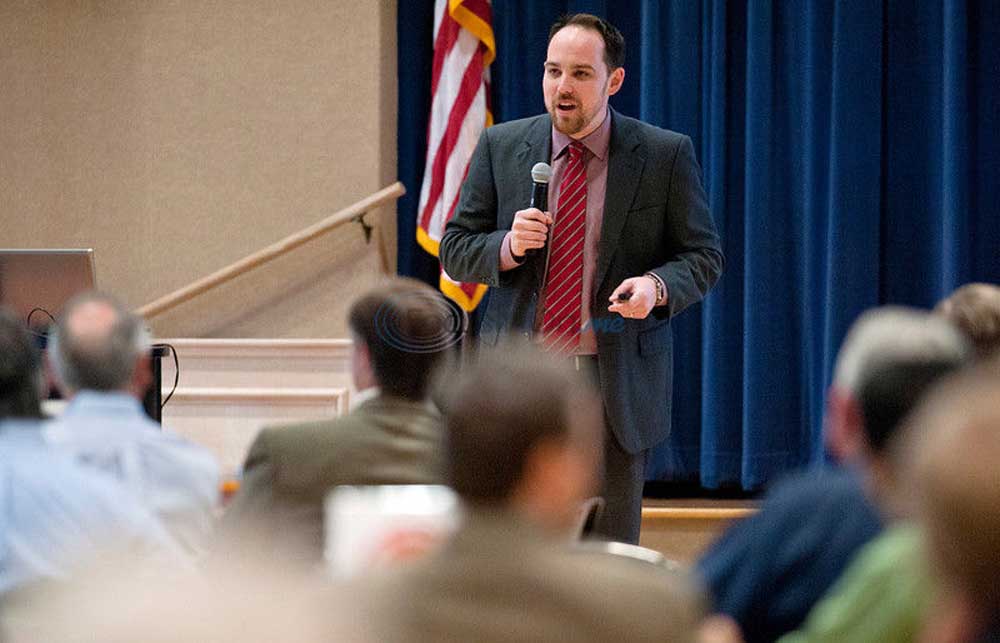Natural gas exports spur new job growth
Published 11:06 pm Monday, March 31, 2014

- photo by Sarah A. Miller/Tyler Morning Telegraph Jason French, director of government and public affairs for Cheniere Energy, gives a presentation on the LNG Market and Outlook at the Tyler Area Energy Summit Monday at the University of Texas at Tyler Ornelas Activity Center.
Jason French believes America is in the midst of an energy revolution.
French, director of government and public affairs for Cheniere Energy, discussed the LNG (liquid natural gas) market and outlook Monday at the 2014 Tyler Area Energy Summit, put on by the Tyler Area Chamber of Commerce’s Energy Committee.
He said the country can look to Texans for leadership because shale gas can be produced viably with new tactics, such as hydro fracturing, or fracking. He said there will be a paradigm shift — from being an energy consumer to becoming an energy superpower.
The results of the energy revolution are becoming clear as manufacturers are beginning to take advantage of natural gas in the United States, creating jobs and economic development by allowing its natural gas to reach the world market, French said.
Houston-based Cheniere Energy’s story mirrors that of the “energy revolution,” French said. It started as an offshore company producing gas in shallow waters off the coast of Louisiana in the 1990s. Cheniere began looking at importing natural gas into Louisiana and Texas. He said 10 years ago, they thought there was a shortage of natural gas in the country.
Now the country is looking to start exporting natural gas, and Cheniere is leading the way, turning its importing plant into a facility that will convert natural gas into LNG and transport it oversees. LNG is natural gas that has been super cooled into a liquid, which makes it safer, more economical and viable for transport.
“It is one of the safest commodities that you could be dealing with,” French said.
The United States is the No. 1 producer of natural gas in the world and has the highest reserves in the world.
“Our production of natural gas is growing by twice the rate of our consumption of natural gas,” he said, adding that Cheniere believes it will be exporting it by this time next year.
Asia and Europe are the centers of global demand for LNG but customers from around the world are signing up with Cheniere for 20-year contracts from their LNG production units under construction in Louisiana and Texas. He said even with costs to liquefy and transport LNG, they can provide it to Asia and Europe for significantly cheaper than they are paying today.
When Cheniere’s first plant in Sabine Pass is completed, it will be one of the largest export facilities in the world, he said, adding that they plan to deliver their first cargo to the international market by the end of 2015. They are also constructing a smaller plant in Corpus Christi.
He said LNG exports means more jobs created, reducing the U.S. trades deficit by as much as $7 billion each year. It also wil advance national security, promote liberalization of the global natural gas trade, improve U.S. balance of payments, increase economic trade, reduce reliance on foreign sources of oil, stimulate local economies and promote stability in domestic natural gas pricing.
“For a country to really have sustainability, it has to have food, water and energy,” Dr. Ken Morgan, director of the TCU Energy Institute, said.
He said the U.S. uses 20 percent of the world’s energy, followed by China at 17 percent. This country gets 85 percent of its energy from fossil fuels, 8 percent from nuclear and 7 percent from renewable.
“The game is changing for the next generation,” he said. “By 2030, the world will need another United States’ worth of energy. … Are we going to be a buyer or are we going to be a seller?”
The country is producing more natural gas than anyone in the world, he said, adding that the U.S. surpassed Russia in 2013.
“It’s an industry with lots of potential for new innovations, new jobs,” he said. “It’s domestic. It’s ours to invest in.”
While oil is $100 a barrel, the equivalent amount of natural gas is $24, Morgan said, adding that it’s also cleaner. He said 60 million homes in America are already on natural gas and all over the country, people are starting to use natural gas compatible vehicles.
Morgan said Exxon Mobile is predicting that natural gas will outpace all energy sources by 2040, increasing by 65 percent, and Asia will lead the way in consumption.
Morgan said the United States is approaching a staggering $17 trillion debt and asked if it could transform from being the biggest buyer of energy to an exporter.
“It’s energy, food, water,” he said. “You’ve got to get that energy ship righted in this country. We need a game plan in our energy future.”
A panel discussion was moderated by Nelson Clyde, publisher of the Tyler Morning Telegraph. The panel, which answered questions from the audience, included Morgan and French, as well as Ernest LaFlure, vice president and general manager of EOG Resources Tyler Division; and Dennis McAfee Jr., senior project manager of Environmental Services for QPS Engineering.
Morgan said converting coal-fired electricity plants to natural gas will take time, but could happen in the next three to five years in some places.
“Texas spends over $200 billion a year to import coal when you’re sitting here on the Haynesville (shale),” he said. “We’re moving to natural gas as quickly and efficiently as we can.”
McAfee said energy companies are looking at ways to use less water during fracking because it’s becoming a big issue. He said a lot of work is going into reducing the footprint of water usage.
Studies found that 10 times more water was wasted in the Dallas Metroplex — by leaks in the system, water turned on when it shouldn’t be and over-usage — than was used for fracking, he said. McAfee said the regulatory process for fracking is becoming more stringent every day.
Gates Brelsford, chairman of the Tyler Area Chamber of Commerce’s Energy Committee, said the mission of the annual Energy Summit, which started four years ago, is to raise awareness of the energy industry in Northeast Texas and to create jobs. About 240 people attended the luncheon.
Sponsors of the event included the city of Tyler, Tyler Chamber, Tyler Economic Development Council, EOG Resources, UT Tyler, TransCanada — Gulf Coast Project, Luminant Power — TXU, Oncor, Fair Oil Ltd., Delek Refining Ltd., Chesapeake Energy, First Alt Fuel Inc., The Genecov Group, XTO Energy and RS&H.






